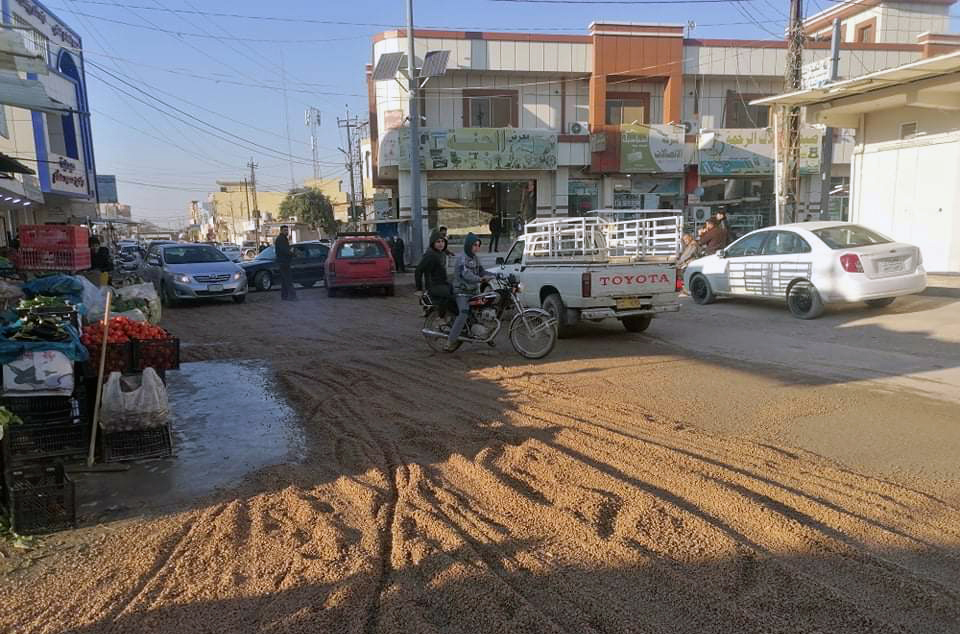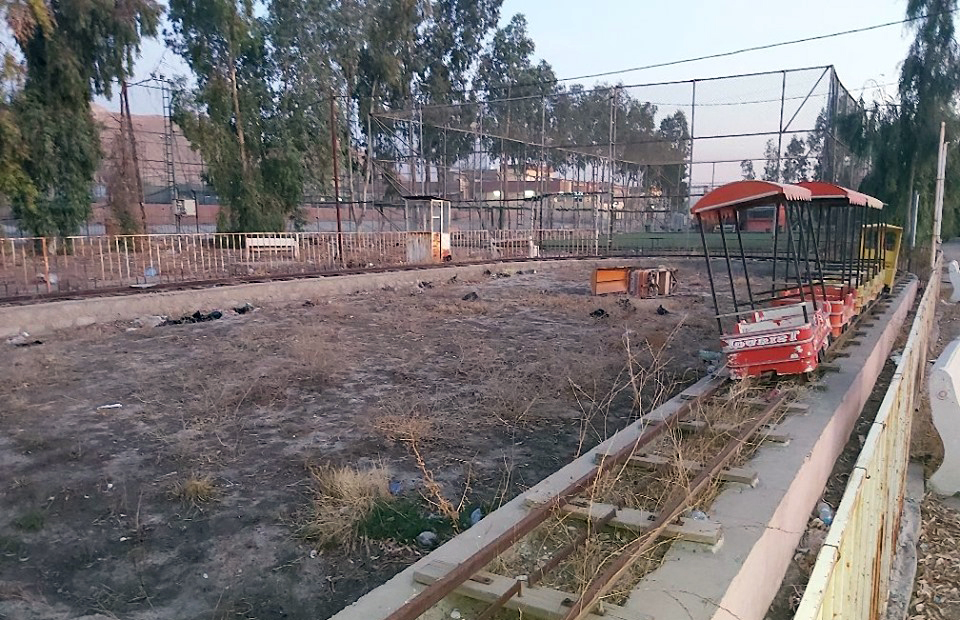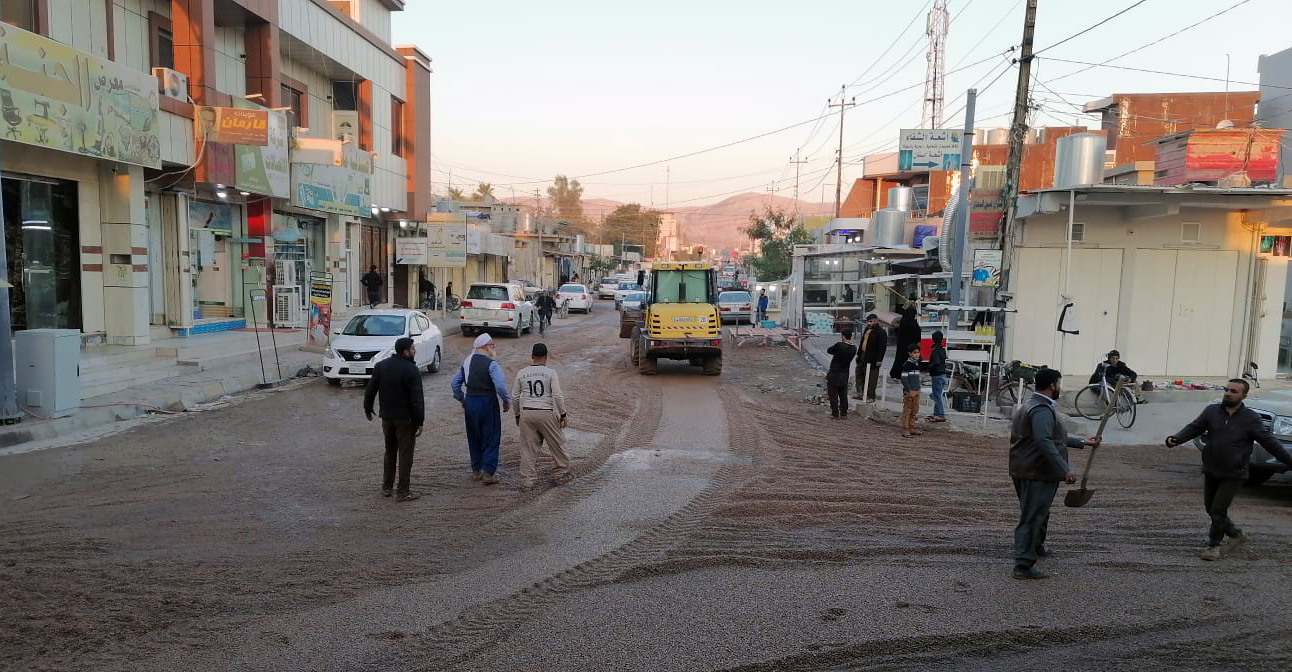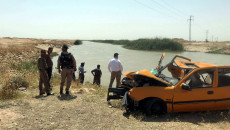A group of residnents in a district of Salahaddin province launched a voluntary campaign to restore some of the main streets within the district due to the suspension of service projects, which the municipality attributed to the lack of the required budget.
With the start of the new year 2022, a number of Kurdish volunteers began restoring potholes and bumps in the main street that passes through the Kumari (the Republican) neighborhood in the middle of the Tuz Khurmatow district, using a mixture of sand and gravel.
The streets and alleys of Tuz Khurmatou were paved tens of years ago and currently are full of potholes and bumps that become a place for rainwater and mud in the winter, while dust and dirt rise from them during the summer months.
“The campaign is in the beginning. We have renovated the street in the middle of the Hasan Quan market in the Kumari neighborhood, and we plan to restore all the other streets and alleys in the neighborhood,” Hemin Najim, a resident of Tuz Khurmatow told (KirkukNow).
Najim explained that the campaign was launched by a group of seven young volunteers at their own expense and with the help of a number of donors who provided them with work equipment.
The campaign will continue until all the streets are restored, depending on their capabilities, since the municipality does not provide them with a helping hand, he added.
The multi-ethnic district of Duz Khurmatu, located 70 kilometers south of Kirkuk and part of Salahaddin province, is the only disputerd town of the province and one of the disputed territories between Erbil and Baghdad, home to 130,000 Turkmens, Kurds and Arabs.
The predominantly Sunni province of Salahaddin, about 135 kilometers north of the Iraqi capital, once home for Saddam Hussein, is under the control of Iraq's Shia-led paramilitary forces known as al-Hashid al-Shabi, the Popular Mobilization Forces PMF.

Salahaddin, January 2022: The streets of Tuz Khurmatuu are full of potholes and bumps. Photo: KirkukNow
According to (KirkukNow) follow-up, Turkmen and Arab residents of other neighborhoods of Tuz Khurmatu undertake the task of restoring streets and implementing service projects for their areas on a voluntary basis.
“We do not have the ability to use cement or asphalt to rehabilitate the streets, all we have is a mixture of sand and gravel, and this is a temporary solution that will not last for a long time, but it is better than nothing. We have to serve ourselves,” says Muhannad Hajj Nasir, a young voluntees.
We do not have the ability to use cement or asphalt to rehabilitate the streets
"The paving of these streets dates back to the period of the rule of the Baath regime and has not been restored since that time. The presence of potholes and bumps in them caused great harm to citizens. Vehicle drivers and citizens complain daily about the poor quality of the streets," Nasir added.
Kumari is one of the big neighborhoods in Tuz Khurmatu and its inhabitants are of the Kurdish component.
"We realize that what we are doing is a temporary solution and the streets will return to the way they were before, but the government does not care about anything and has stopped the implementation of service projects," Muhannad said.
In late 2020, representatives of Kurds, Arabs and Turkmen residents of Tuz Khurmatu, visited Barham Salih, the Iraqi President, a Kurd, in Baghdad to request the provision of service projects such as roads, electricity, water, schools and the health sector. Despite the promises they obtained regarding the delivery of their demands to the government and their fulfillment, their efforts resulted in nothing.

Salahaddin, 2020: Abandoned and neglected amusement park in Tuz Khurmatu. Laila Ahmed
Local officials blame poor rehab services of public roads to lack of budget.
Hewa Ghaleb Majid, an engineer in the Planning Department in the municipality of Tuz Khurmatu, pointed out that the rehabilitation of the streets was part of the municipality's projects for 2017 but it stopped then temporarily resumed in 2019.
The official in the municipality explained the municipality's projects were launched again in 2021 and they initially restored the streets of Al-Askari neighborhood, which stopped a month ago due to the lack of the necessary budget.
“The reason for stopping these projects is that Salahaddin administration does not allocate a budget for it. On the other hand, the contractors refuse to complete the projects. We can provide them with sand and gravel, but that is not a solution,” says Ghaleb.
"Citizens have the right to request services, but these voluntary projects are short-term and not the solution. The streets are very old and cannot be restored with a mixture of sand and gravel."






